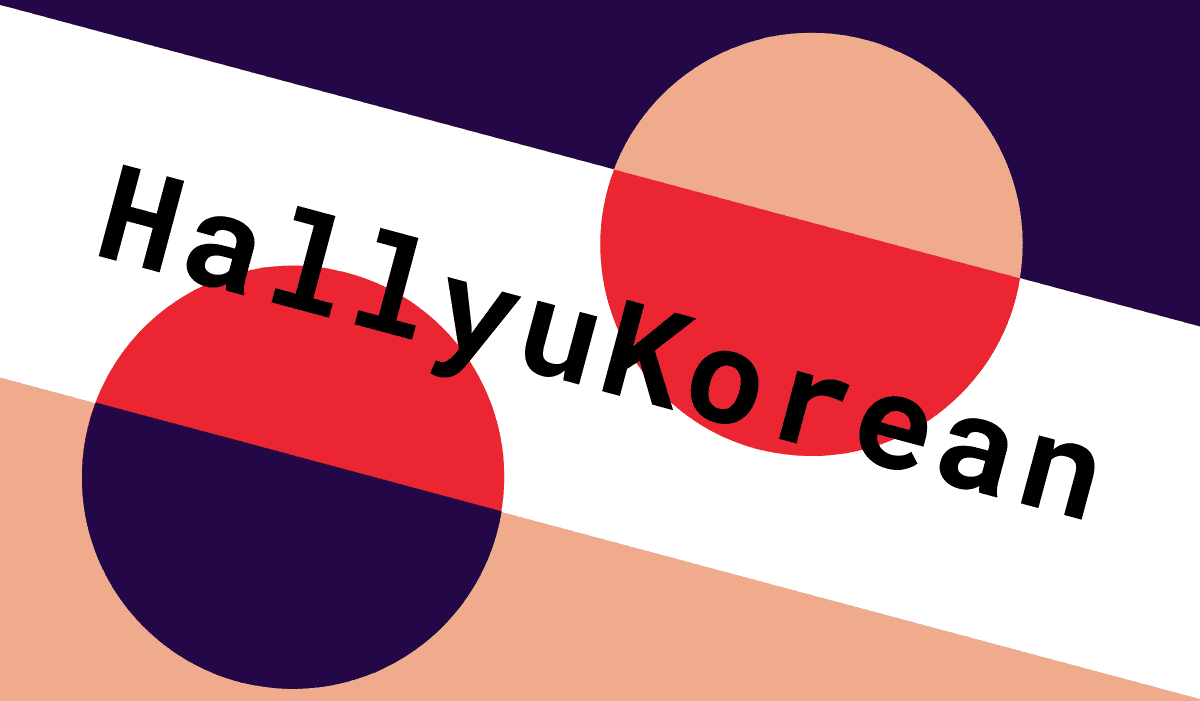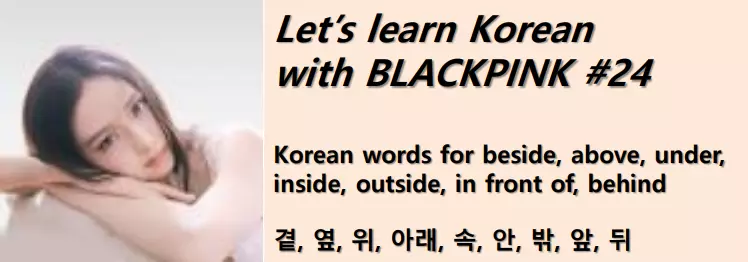Korean location preposition : 곁, 옆, 위, 아래, 속, 안, 밖, 앞, 뒤
Let’s learn location prepositions with BLACKPINK lyrics.
Click the play button below to listen to all the BLACKPINK lyrics used in this post.
곁 [gyeot] side
곁에 [gyeo-te] beside
내 곁에만 있어줘 zoom zoom
nae gyeo-te-man it-sseo-jwo zoom zoom
Just stay by my side, zoom, zoom
*내(나(I) + 의(of), =내) +
곁(side) + 에(at) + 만(only) +
있어줘 (있다(be) + 줘(주다(give) + 어(an imperative ending suffix))
zoom zoom
옆 [yeop] side
옆에 [yeo-pe] by the side
내 옆엔 초라한 빈자리 하나
nae yeo-pen cho-ra-han bin-ja-ri ha-na
Next to me is an empty space
*내(나(I) + 의(of), =내) +
옆엔(옆(side) + 에(at) + 는(topic particle), =옆엔) +
초라한(초라하다(be poor) + ㄴ(noun modifier)) +
빈(empty) + 자리(seat) +
하나(one)
위 [wi] top, above
위에 [wi-e] above
캄캄한 저 하늘 위에 한바탕 난리를 치며 불을 지를 거야
kam-ka-man jeo ha-neul wi-e han-ba-tang nan-ri-reul chi-myeo bu-reul ji-reul geo-ya
I’m going to make a scene and set fire to the dark sky above us
*캄캄한(캄캄하다(be dark) + ㄴ(noun modifier)) +
저(that) +
하늘(sky) +
위에(above) +
한바탕(a scene) +
난리(mess) + 를(object particle) +
치며(치다(hit) + 며(while)) +
불(fire) + 을(object particle) +
지를 거야(지르다(set) + ~을 거야(future tense))
(*난리를 치다 means ‘make a fuss’.)
아래 [a-rae] the bottom, under
아래에 [a-rae-e] under
달빛 아래 내 마음은 설레
dal-bit a-rae nae ma-eu-meun seol-le
Under the moonlight my heart flutters
*달(moon) + 빛(light) +
아래(under)+
내(나(I) + 의(of), =내) +
마음(heart) + 은(topic particle) +
설레(flutter)
속 [sok] the inside, in
속에 [so-ge] in
내 세상 속엔 너만 있으면 돼
nae se-sang so-gen neo-man i-sseu-myeon dwae
All I need in my world is you
*내(나(I) + 의(of), =내) +
세상(world) +
속(inside) + 엔(에(at) +는(topic particle), =엔) +
너(you) + 만(only) +
있으면(있다(exist) + 으면(a connective ending used when speaking hypothetically)) +
돼(be)
안 [an] the inside, in
안에 [a-ne] in
이 방 안의 일은 전부 비밀이야
i bang a-nui i-reun jeon-bu bi-mi-riy-a
Everything in this room is a secret
*이(this) +
방(room) +
안(the inside) + 의(of) +
일(thing) + 은(topic particle) +
전부(everything) +
비밀이야(비밀(secret) + 이다(be))
(*The word ‘전부’ is actually a combination of Chinese characters. ‘전’ (jeon) means ‘complete’ or ‘all’ and ‘부’ (bu) means ‘part’ or ‘section’.
As a result, ‘전부’ combines these two characters to convey the meaning of ‘completely all’ or ‘everything in its entirety’. This phrase is used to indicate that something includes all parts within a certain scope or set, and encompasses the entirety of something, whether it’s all parts or sections.)
밖 [bak] the outside, outside
밖에 [ba-kke] outside
저희가 아시아 밖으로 나갈 거라는 얘기를 들었을 때는 꿈만 같았어요
jeo-hui-ga a-si-a ba-kkeu-ro na-gal geo-ra-neun yae-gi-reul deu-reot-sseul ttae-neun kkum-man ga-ta-sseo-yo
When I heard we were going out of Asia, it was like a dream
*저희(we) + 가(subject particle) +
아시아(Asia) +
밖(outside) + 으로(towards) +
나갈(나가다(go out) + ㄹ(noun modifier)) +
거(thing) + 라는(called) +
얘기(story) + 를(object particle) +
들었을(듣다(hear) + 었다(past tense) + 을(noun modifier)) +
때(time) + 는(topic particle) +
꿈(dream) + 만(only) +
같았어요(같다(be like) + 았어요(past tense))
(*나 and 저 both mean I or me. 저 is a humble way of saying 나.
나 and 저 are the singular of I and the plural is 저희(들).
너 is the singular of you and the plural is 너희(들). 너 and 너희 are used in casual conversation, especially when the listener is no older than you.)
앞 [ap] the front
앞에 [a-pe] before
지금 너의 두 눈 앞에 서있는 내 이름을 기억해
ji-geum neo-ui du nun a-pe seo-it-neun nae i-reu-meul gi-eo-kae
Remember my name that now stands before your eyes
*지금(now) +
너(you) + 의(of) +
두(two) +
눈(eye) +
앞(front) + 에(in) +
서있는(서다(stand) + 있다(be) + 는(noun modifier)) +
내(나(I) + 의(of), =내) +
이름(name) + 을(object particle) +
기억(memory) + 해(do)
(*In some cases, nouns can be turned into verbs by simply adding the verb 하다 (to do, to be).
하다 [hada] (to do) is the dictionary form and there are several conjugations of 하다 in Korean.
1)해라[haera] 2)해[hae] 3)해요[haeyo] 4)하십시오[hasipsio]
해요, 해 are informal and are usually used in everyday conversation.
The politeness level is 1 < 2 < 3 < 4.
해요, 해 can both be used as imperative or declarative depending on the context.)
뒤 [dwi] back
뒤에 [dwi-e] after, behind
난 뒤를 볼 수 있을까?
nan dwi-reul bol su i-sseu-lkka?
Will I be able to see behind me?
*난(나(I) + 는(topic particle), =난) +
뒤(behind) + 를(object particle) +
볼 수(보다(see) + ~ㄹ 수(dependent noun)) +
있을까?(있다(be, exist) + 을까?)
(*Verb stem + ~ㄹ 수 있다 means ‘can’ and Verb stem + ~ㄹ 수 없다 means ‘can’t’.
~ㄹ/을까 can be used to ask a question, express an intention or worry.)
Grammar Reference
*Adjective[verb] stem + ㄴ/은/는/을 + noun : noun that adjective[verb]
ex)초라한 빈 자리 : 초라하다(be poor) + ㄴ(noun modifier) + 빈(empty) + 자리(seat) +
캄캄한 저 하늘 : 캄캄하다(be dark) + ㄴ(noun modifier)) + 저(that) + 하늘(sky)
들었을 때 : 듣다(hear) + 었다(past tense) + 을(noun modifier)) + 때(time)
ㄴ/은/는/을 is added to verbs and adjectives to make them work as noun modifiers.
*Noun + 하다 : verb
Many Korean nouns that indicate or describe an action or behavior can be combined with 하다 to form verbs.
In some cases, nouns can be turned into verbs by simply adding the verb 하다 (to do).
ex)기억해: 기억(memory) + 해(do)

